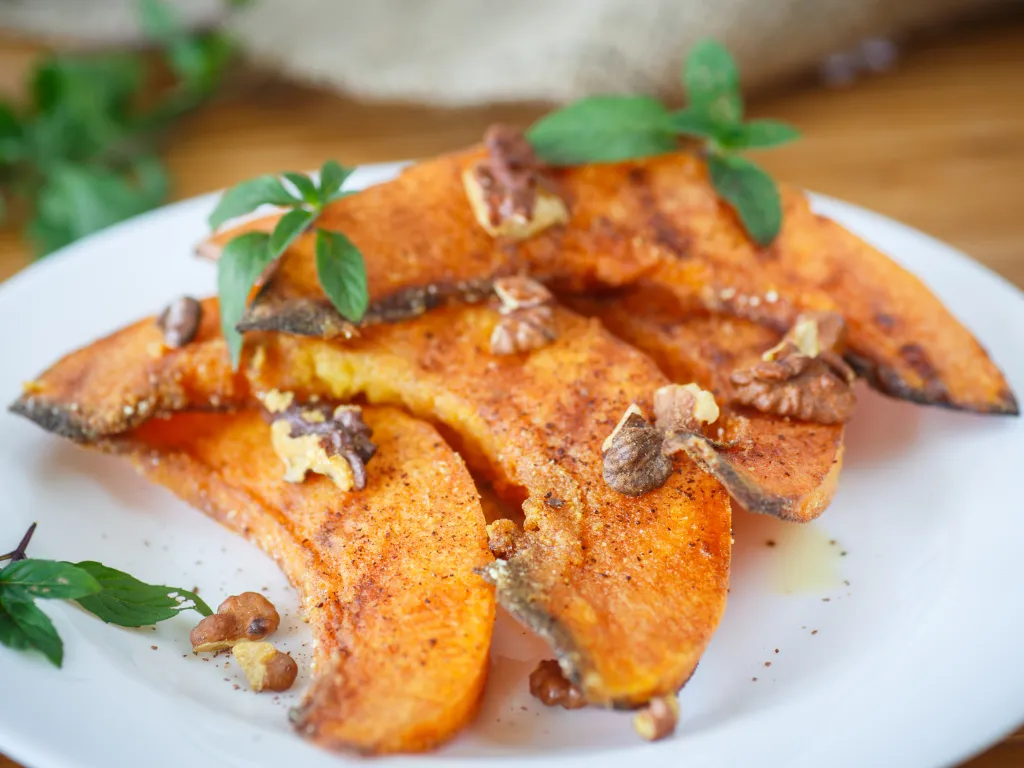As we strive to maintain a healthy heart, we are constantly looking for nutrient-rich foods to include in our diets. While we tend to focus on protein and healthy fats, it’s important not to forget about carbohydrates. Carbohydrates provide our bodies with energy and are an essential part of a healthy diet. And one often overlooked source of carbohydrates is the humble pumpkin.

Pumpkins are more than just a decoration for Halloween; they’re also a great addition to your heart-healthy diet. Here are some of the benefits of incorporating pumpkin into your meals:
- Low in Calories and High in Fiber: Pumpkins are low in calories and high in fiber, making them an excellent food choice for weight management. The fiber in pumpkin can help you feel fuller for longer, reducing the risk of overeating and helping to regulate blood sugar levels. On average, 100g of pumpkin is around 45-50 cal.
- Rich in Potassium: Potassium is an essential nutrient that plays a crucial role in heart health. It helps to regulate blood pressure and reduce the risk of stroke. Pumpkins are an excellent source of potassium, with one cup of cooked pumpkin providing almost 600mg of this important mineral.
- Loaded with Antioxidants: Pumpkins are also rich in antioxidants, which can help reduce inflammation and protect against damage from free radicals. The antioxidants in pumpkin can help to reduce the risk of heart disease and other chronic illnesses.
- Versatile and Delicious: Pumpkins are incredibly versatile and can be incorporated into a wide variety of dishes. They can be roasted, pureed, or baked, and are delicious in soups, stews, and even desserts. You can also use pumpkin puree as a healthy substitute for butter or oil in baking recipes.
- Rich in Carotenoids: Pumpkins get their bright orange color from carotenoids, which are powerful antioxidants that have been shown to reduce the risk of heart disease. These compounds may also help to lower cholesterol levels and improve heart health.
Recipe Idea
Roasted Pumpkin and Chicken Quinoa Salad (Single Serve)
Ingredients:
- 300g diced pumpkin
- 180g boneless, skinless chicken breast
- 1/2 cup cooked quinoa
- 1 cup mixed leafy greens
- 15g chopped walnuts (for garnish)
- 2 tablespoons olive oil
- 1 tablespoon balsamic vinegar
- 1/2 clove garlic, minced (for dressing)
- Fresh oregano or parsley, finely chopped (for dressing)
- Salt and pepper to taste
Instructions:
- Preheat your air fryer to 400°F (200°C).
- Toss the diced pumpkin with half a tablespoon of olive oil, season with salt and pepper, and place it in the air fryer basket. Air fry for about 8-12 minutes, until the pumpkin is tender and slightly caramelized.
- While the pumpkin is air frying, marinate the chicken breast with a drizzle of olive oil, salt, and pepper. Grill the chicken until cooked through. Once cooked, slice the chicken into thin strips.
- In a bowl, mix the cooked quinoa, air-fried pumpkin, and sliced chicken.
- Add the mixed greens to the bowl.
- In a small bowl, whisk together the remaining tablespoon of olive oil, balsamic vinegar, minced garlic, and finely chopped fresh oregano or parsley, salt, and pepper to form the dressing. Drizzle the dressing over the salad and toss to combine.
- Garnish the salad with chopped walnuts.
- Serve the roasted pumpkin and chicken quinoa salad as a satisfying single-serve meal.
TIP 1: Using the air fryer for roasting the pumpkin adds a crispy texture to this dish, enhancing its flavor and maintaining its nutritious profile.
TIP 2: Elevate your cooking with a self-pumping oil spray. Say goodbye to imprecise pouring from bottles. A spray ensures comprehensive coverage using less oil, while also aiding in calorie control and more precise tracking.
Nutritional Information:
| Calories | 755 |
| Total Fat | 40g (saturated 6g, polyunsaturated 11g, monounsaturated 23g) |
| Total Carbohydrates | 46g |
| Total Protein | 53g |
Conclusions
In conclusion, pumpkin is an excellent carbohydrate source to include in your heart-healthy diet. It’s low in calories, high in fiber, and rich in potassium, antioxidants, and carotenoids. So, why not try incorporating more pumpkin into your meals? Whether roasted, pureed, or baked, there are countless ways to enjoy this delicious and nutritious food.



